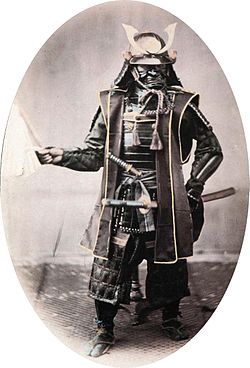Bushido
Regulations for samurai attitudes, behavior and lifestyle. Overarching term for all the codes, practices, philosophies and principles of samurai culture
(Redirected from Bushidō)
Bushidō (武士道, Bushidō), meaning "Way of the Warrior", is a Japanese code of conduct and a way of life, more or less similar to the European code of chivalry. It comes from the samurai moral code and gives great importance to certain virtues like frugality, loyalty, martial arts mastery and honour until voluntary death, seppuku. Bushidō was created between the 11th to 14th centuries and took form as a code from the 12th to 16th centuries.

Under the Tokugawa Shogunate, Bushidō became official Japanese Feudal Law.[1] Honor codes are still used in modern times; for example, as part of the kamikaze beliefs.
Related pages
changeReferences
change- ↑ "Japanese Feudal Laws John Carey Hall, The Tokugawa Legislation, (Yokohama, 1910), pp. 286-319". Archived from the original on 2012-10-21. Retrieved 2007-08-27.